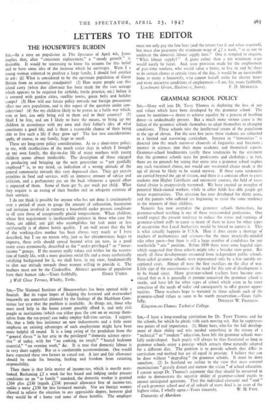GRAMMAR SCHOOL POLICY
Sue—Many will join Dr. Terry Thomas in deploring the loss of any real values which have been developed by the grammar school. The cause he mentions—a desire to achieve equality by a process of levelling down--is undoubtedly present. But a much more serious cause is the failure of the grammar schools themselves to adapt themselves to changing conditions. These schools take the intellectual cream of the population at the age of eleven. For the next five years these students are subjected to a limited and narrowing curriculum. Interest in " humanities " is directed into the much narrower channels of linguistics and literature ; interest in sciences into their more academic and theoretical aspects. Grammar-school headmasters justify these tendencies by the statement that the grammar schools train for professions and clerkships ; in fact, there are no grounds for saying that entry into a grammar school implies any such vocational choice, nor would any vocational choice made at the age of eleven be likely to be sound anyway. If these same tendencies are carried beyond the age of sixteen, and there is a constant effort to r ress students into Higher Certificate and university courses, the field of voca- tional choice is progressively narrowed. We have created an overplus of potential black-coated workers, while in other fields less able people get better opportunities. This situation has now developed for thirty years, and the parents who suffered are beginning to resist the same tendency in the interests of their children.
Nemesis has now overtaken the grammar schools themselves, for grammar-school teaching is one of these overcrowded professions. One would expect the present tendency to reduce the status and earnings of grammar-school staffs to cause so many of them to leave for other types of occupation that Local Authorities would be forced to correct it. This is what actually happens in U.S.A. Here it does create a shortage of teachers of mathematics and sciences—for the more practically-minded take other posts—but there is still a large number of candidates for any worthwhile " arts position. Before 1939 there were some hopeful signs which suggested that these schools might take a broader view-point. But nearly all these developments emanated from independent public schools. State-aided grammar schools were represented only by a few notable ex- ceptional cases. Almost all were the first sacrifices on the altar of war. Little sign of the consciousness of the need for this sort of development is to be found since. Many grammar-school teachers have become con- vinced that as it is generally at present conceived the grammar school is sterile, and have left for other types of school which seem to be more conscious of the needs of today and consequently to offer greater oppor- tunities. These teachers hope to transmit to those schools such of the grammar-school values as seem to be worth preservation.—Yours faith-
fully, DOUGLAS W. FRANKLIN. Kingston-on-Thames Technical College.


































 Previous page
Previous page